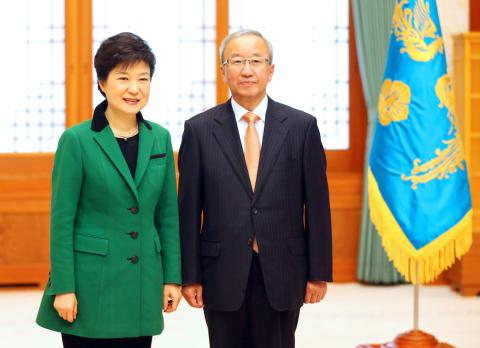South Korean President Park Geun-hye is appointing Hyun Oh-seok as finance minister, paving the way for stimulus measures to boost growth in Asia’s fourth-biggest economy.
Hyun, 62, was to be appointed yesterday afternoon, Park’s spokeswoman Kim Haeng said at a briefing televised on YTN network.
Pressing on with Hyun’s appointment in the face of objections from opposition lawmakers may bring forward measures that Park hopes will spur the economy after growth last year was the weakest since the global financial crisis.

Photo: EPA
After his nomination, Hyun said short-term policy support is needed.
“Hyun becoming finance chief is likely to speed up preparation for a stimulus package, given that Hyun shares the view that a policy boost is needed,” said Kim Hyeon-wook, an economist at SK Research Institute who has worked under Hyun.
Hyun was president of the state research center Korea Development Institute, which was founded by Park’s father, former dictator Park Chung-hee.
He has a PhD in economics from the University of Pennsylvania and previously worked at the World Bank, as well as South Korea’s finance ministry.
The government may announce a supplementary budget of 10 trillion won (US$8.9 billion) on Tuesday, Yonhap News reported this week, without saying where it got the information.
South Korean Ministry of Strategy and Finance Director-General Choi Sang-mok said no decision had been made.
Delays in filling the finance minister slot have been costly because consumers and companies are delaying spending until they see the new government’s stance, said Kong Dong-rak, a fixed-income analyst at Hanwha Investment & Securities Co in Seoul.
“It’s a great loss to our economy to have the economic-policy control tower empty for nearly a month,” Kong said.
South Korean officials aim to get the nation closer to a potential growth rate estimated by central bank Governor Kim Choong-soo at 3.8 percent, after last year’s 2 percent expansion was the weakest since 2009.
Challenges include a stagnant property market, an aging population and weakness in the yen that aids export competitors in Japan.
“Hyun will need to announce at least 20 trillion won of supplementary spending to achieve growth of about 3 percent this year,” Lee Chul-hee, chief economist at Tongyang Securities Inc, said by telephone in Seoul.

To many, Tatu City on the outskirts of Nairobi looks like a success. The first city entirely built by a private company to be operational in east Africa, with about 25,000 people living and working there, it accounts for about two-thirds of all foreign investment in Kenya. Its low-tax status has attracted more than 100 businesses including Heineken, coffee brand Dormans, and the biggest call-center and cold-chain transport firms in the region. However, to some local politicians, Tatu City has looked more like a target for extortion. A parade of governors have demanded land worth millions of dollars in exchange

Hong Kong authorities ramped up sales of the local dollar as the greenback’s slide threatened the foreign-exchange peg. The Hong Kong Monetary Authority (HKMA) sold a record HK$60.5 billion (US$7.8 billion) of the city’s currency, according to an alert sent on its Bloomberg page yesterday in Asia, after it tested the upper end of its trading band. That added to the HK$56.1 billion of sales versus the greenback since Friday. The rapid intervention signals efforts from the city’s authorities to limit the local currency’s moves within its HK$7.75 to HK$7.85 per US dollar trading band. Heavy sales of the local dollar by

Taiwan Semiconductor Manufacturing Co’s (TSMC, 台積電) revenue jumped 48 percent last month, underscoring how electronics firms scrambled to acquire essential components before global tariffs took effect. The main chipmaker for Apple Inc and Nvidia Corp reported monthly sales of NT$349.6 billion (US$11.6 billion). That compares with the average analysts’ estimate for a 38 percent rise in second-quarter revenue. US President Donald Trump’s trade war is prompting economists to retool GDP forecasts worldwide, casting doubt over the outlook for everything from iPhone demand to computing and datacenter construction. However, TSMC — a barometer for global tech spending given its central role in the

The Financial Supervisory Commission (FSC) yesterday met with some of the nation’s largest insurance companies as a skyrocketing New Taiwan dollar piles pressure on their hundreds of billions of dollars in US bond investments. The commission has asked some life insurance firms, among the biggest Asian holders of US debt, to discuss how the rapidly strengthening NT dollar has impacted their operations, people familiar with the matter said. The meeting took place as the NT dollar jumped as much as 5 percent yesterday, its biggest intraday gain in more than three decades. The local currency surged as exporters rushed to